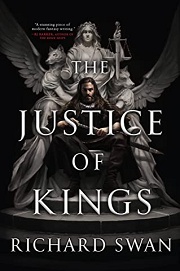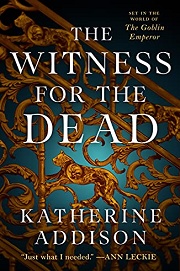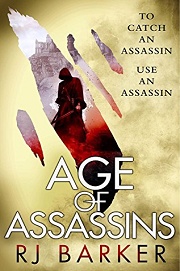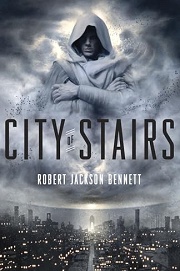Share your thoughts in a quick Shelf Talk!
The Justice of Kings by Richard Swan
In a law-haunted empire where verdicts are carried on the road, a famed magistrate and his sharp-witted apprentice probe a brutal crime that unravels into treachery at the heart of power. As methodical investigation collides with forbidden magic and political menace, they must decide how far justice can go before it breaks. Blending legal thriller tension with grim, spellbound intrigue, The Justice of Kings grips from the first question to the final gavel.
Have you read this book? Share what you liked (or didn’t), and we’ll use your answers to recommend your next favorite read!
Love The Justice of Kings but not sure what to read next?
These picks are popular with readers who enjoyed this book. Complete a quick Shelf Talk to get recommendations made just for you! Warning: possible spoilers for The Justice of Kings below.
In The Justice of Kings, did you enjoy ...
... the meticulous, clue-by-clue fantasy investigation led by an official who can question the dead?
The Witness for the Dead by Katherine Addison
You liked how Konrad Vonvalt, with Helena at his side, parses lies and testimony—sometimes with the terrifying aid of the Voice and necromancy—to peel back a murder’s layers. In The Witness for the Dead, Thara Celehar plies a gentler but equally uncanny craft in Amalo: speaking with the recently deceased to untangle an opera singer’s death, a missing heirloom, and a corpse dumped in a canal. The same sober, procedural feel you enjoyed in Vonvalt’s inquiries—interviews, legal niceties, and moral knots—drives Celehar’s cases, with the added resonance of literally hearing what victims can (and can’t) tell.
... a sharp mentor–apprentice bond shaping a young narrator’s craft and conscience?
Age of Assassins by R. J. Barker
If Helena’s first-hand apprenticeship—watching Vonvalt weigh law against mercy while Sir Bressinger handles the steel—was your hook, you’ll love Girton Club-foot learning the trade under the ruthless, protective Merela Karn. When they’re tasked to unmask a traitor at court, Girton’s training becomes a crucible much like Helena’s: observing, infiltrating, and deciding what lines he will or won’t cross. As with Vonvalt’s lessons on justice amid Claver’s sedition, the guidance here is as dangerous as it is formative.
... murder and statecraft colliding in a conquered city where history itself is a weapon?
City Of Stairs by Robert Jackson Bennett
You followed Vonvalt’s casework straight into the gears of empire—the seditious sermons, the legal wrangling, the way one corpse exposes a wider conspiracy. In City of Stairs, spy-diplomat Shara Komayd investigates a historian’s murder in Bulikov and uncovers plots tangled with suppressed gods and colonial politics. Like the showdown looming over Claver’s movement, every discovery here threatens to tip a fragile order, and every testimony has stakes far beyond the courtroom.
... a razor-edged protagonist enforcing order with methods that stain the soul?
The Blade Itself by Joe Abercrombie
Konrad Vonvalt’s readiness to compel truth—and even raise the dead for answers—casts a long ethical shadow that Helena never lets you ignore. Meet Inquisitor Glokta, whose interrogations and compromises in Adua echo that same queasy blend of necessity and brutality. If Vonvalt’s courtroom scenes made you wonder what justice costs the man who serves it, Glokta’s sardonic voice, torture chambers, and entanglement with corrupt power will scratch that itch from a darker angle.
... the harrowing moral weight of wielding extraordinary power in service of the state?
The Poppy War by R. F. Kuang
When Vonvalt unleashes the Voice or necromancy, Helena sees both the efficacy and the toll—on victims, on bystanders, and on Vonvalt himself. The Poppy War presses that question harder: Rin’s shamanic bond with the Phoenix can end wars, but every invocation demands an awful price. As with Vonvalt’s tightrope between law and ruthlessness amid rising unrest, Rin faces choices where victory and atrocity blur, forcing you to ask what justice means when power can do anything.
Unlock your personalized book recommendations! Just take a quick Shelf Talk for The Justice of Kings by Richard Swan. It’s only a few questions and takes less than a minute.





